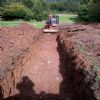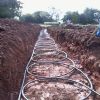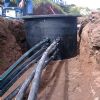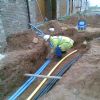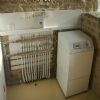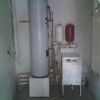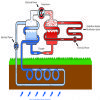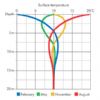Up to 4x more efficient than the most efficient gas or oil boilers
Approved distributors and installers
Environmentally friendly heating solutions
MCS accreditation
Sustainable heating solutions
Heat Pumps - Closed Loop
FWT are specialists in the supply and installation of closed loop ground source heat pumps, with many years experience and an extensive portfolio, we install systems throughout South Wales and Southwest England. We offer turnkey solutions for GSHP installations; that is we undertake all the work needed to get the system up and running from the initial design to installation and commissioning ensuring you get the right system for your home or property.
FWT are accredited installers and distributors for Kensa Heat Pumps. Combining engineering ingenuity and years of ground source expertise, every heat pump in the Kensa range has been designed and tested to exacting standards for optimum efficiency and ease of use.
Closed loop heat pump overview
Ground Source Heat Pumps are an established technology that have been around for over 50 years. Radiation from the sun heats the earth; the earth then stores the heat and maintains, just two metres down, a temperature of around 10°C even throughout the winter. A ground source heat pump uses a ground heat exchange loop to tap into this constantly replenished heat store to heat buildings and provide hot water This is broadly the same principle as the heat pump bolted to the back of a conventional refrigerator. Instead of extracting heat from your fridge and depositing the warmer air into your kitchen, a GSHP extracts the heat from the ground and transfers it into your home for heating and/or domestic hot water.
The heat pump circulates a mixture of water and antifreeze around a loop of pipe, called a ground loop, which is buried in your garden or lake. Heat from the ground or lake is absorbed into the fluid and then passes through a heat exchanger into the heat pump. The ground stays at a fairly constant temperature under the surface, so the heat pump can be used throughout the year, even in the middle of winter.
The length of the ground loop depends on the size of your home and the heat load you require. Longer loops can draw more heat from the ground, but need more space to be buried in. If space is limited, a vertical borehole can be drilled instead.
In order to provide initial guidance on the suitability of your property for a ground source heat pump installation we typically need to know the following:
- The size of the property including plans if available (square meterage of areas to be heated)
- A copy of your SAP report or EPC if available
- A map detailing the boundary of your property
The benefits of ground source heat pumps
(as listed by The Energy Savings Trust)
- It could lower your fuel bills, especially if you replace conventional electric heating.
- It could provide you with an income through the government’s Renewable Heat Incentive (RHI)
- It could lower home carbon emissions, depending on which fuel you are replacing.
- There are no fuel deliveries needed.
- It will heat your home as well as your water.
- There is minimal maintenance required.
- Unlike gas and oil boilers, heat pumps deliver heat at lower temperatures over much longer periods.
- In winter, it may need to be on constantly to heat your home efficiently, but radiators won't feel as hot to the touch as with a gas or oil boiler.
- Often they are more difficult to install than air source heat pumps, but ground source heat pumps are often more energy efficient.
| Related images in this section Click for a larger image and description |
|
|


